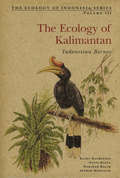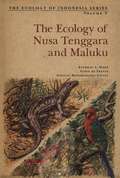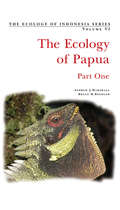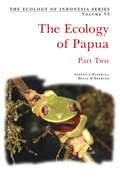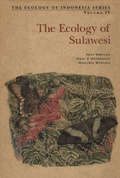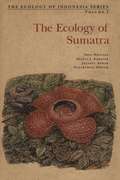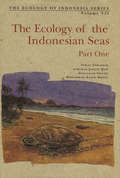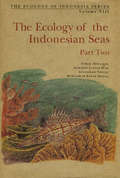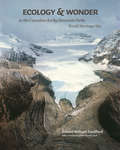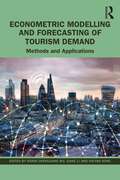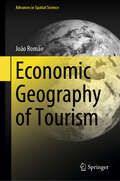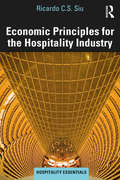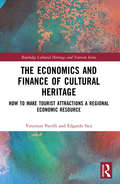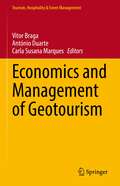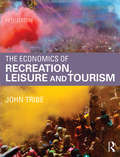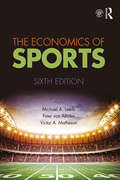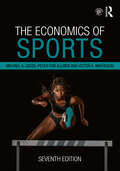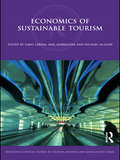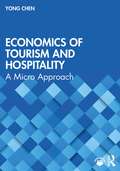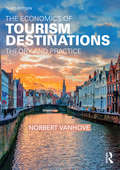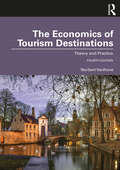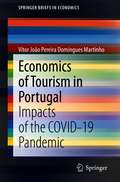- Table View
- List View
The Ecology of Kalimantan
by Arthur Mangalik Hakimah Halim Gusti Hatta Kathy MackinnonThis Iong-awaited book distills for the first time the information found in many thousands of scholarly documents relevant to an understanding of the full range of natural and man-made ecosystems on the island--many of them available up to now only in Dutch, German or Indonesian. This book presents a complete summary of our current scientific knowledge about Borneo including the rainforest and riverine habitats that are endangered by logging and industrial development, along with a discussion of land use patterns and current problems.Kalimantan is the Indonesian portion of the huge island of Borneo. Kalimantan has played a key role in Indonesia's economic development and is a major earner of foreign revenue due to the island's rich natural resources: forests, oil, gas, coal, and other minerals. In this book the authors argue that Kalimantan can be developed, but within tight ecological constraints and with great care. This book remains a standard reference for scientists, anthropologists, writers, and anyone interested in the region.
The Ecology of Kalimantan
by Arthur Mangalik Kathy Mackinnon Hakimah Halim Gusti HattaThis Iong-awaited book distills for the first time the information found in many thousands of scholarly documents relevant to an understanding of the full range of natural and man-made ecosystems on the island--many of them available up to now only in Dutch, German or Indonesian. This book presents a complete summary of our current scientific knowledge about Borneo including the rainforest and riverine habitats that are endangered by logging and industrial development, along with a discussion of land use patterns and current problems.Kalimantan is the Indonesian portion of the huge island of Borneo. Kalimantan has played a key role in Indonesia's economic development and is a major earner of foreign revenue due to the island's rich natural resources: forests, oil, gas, coal, and other minerals. In this book the authors argue that Kalimantan can be developed, but within tight ecological constraints and with great care. This book remains a standard reference for scientists, anthropologists, writers, and anyone interested in the region.
Ecology of Nusa Tenggara and Maluku
by Yance De Fretes Kathryn A. Monk Gayatri Reksodiharjo-LilleyThe Ecology of Nusa Tenggara and Maluku distills for the first time the information found in thousands of scholarly documents relevant to an understanding of the full range of natural and man-made ecosystems on these islands--many of them available up to now only in Dutch, German or Indonesian. It contains extensive baseline data on the region's people, ecosystems, biodiversity and land use, and discusses these in a historical as well as a developmental context. It also provides guidelines for scientific researchers on worthwhile ecological and socio-economic research projects.This region is the most diverse in Indonesia. Its myriad islands range from small atolls to active volcanic islands rising 3,500 meters above sea level. Each province has extensive coastlines--only 10 percent of the province of Maluku is land. The seas include shallow continental shelves and some of the deepest sea basins in the world. The complexity and vulnerability of these islands mean that development and environment are inextricably linked. If this is not understood and acted upon, there is no possibility for the ecologically sustainable development of Nusa Tenggara and Maluku.
The Ecology of Papua: Part One
by Bruce M. Beehler Andrew J. MarshallThe Ecology of Papua brings together 76 authors to catalog for the first time the many facets of Papua's environment. Designed for students of conservation, environmental workers, and academic researchers, it is a richly detailed text, dense with biogeographical data, historical reference, and fresh insight on this complicated and marvelous region. We hope it will serve to raise awareness of Papua on a global as well as local scale, and to catalyze effective conservation of its most precious natural assets.New Guinea is the largest and highest tropical island, and one of the last great wilderness areas remaining on Earth. Papua is noteworthy for its equatorial glaciers, its vast forested floodplains, its imposing central mountain range, its Raja Ampat Archipelago, and its several hundred traditional forest-dwelling societies. Papua remains inadequately studied and largely pristine. One of the wildest places left in the world, Papua possesses extraordinary biological and cultural diversity. Today, Papua's environment is under threat from growing outside pressures to exploit its expansive forests and to develop large plantations of oil palm and biofuels. It is important that Papua's leadership balance economic development with good resource management, to ensure the long-term well-being of its culturally diverse populace.
The Ecology of Papua: Part Two
by Bruce M. Beehler Andrew J. MarshallThe Ecology of Papua brings together 76 authors to catalog for the first time the many facets of Papua's environment. Designed for students of conservation, environmental workers, and academic researchers, it is a richly detailed text, dense with biogeographical data, historical reference, and fresh insight on this complicated and marvelous region. We hope it will serve to raise awareness of Papua on a global as well as local scale, and to catalyze effective conservation of its most precious natural assets.New Guinea is the largest and highest tropical island, and one of the last great wilderness areas remaining on Earth. Papua is noteworthy for its equatorial glaciers, its vast forested floodplains, its imposing central mountain range, its Raja Ampat Archipelago, and its several hundred traditional forest-dwelling societies. Papua remains inadequately studied and largely pristine. One of the wildest places left in the world, Papua possesses extraordinary biological and cultural diversity. Today, Papua's environment is under threat from growing outside pressures to exploit its expansive forests and to develop large plantations of oil palm and biofuels. It is important that Papua's leadership balance economic development with good resource management, to ensure the long-term well-being of its culturally diverse populace.
Ecology of Sulawesi
by Tony Whitten Muslimin Mustafa Greg S. HendersonThe Ecology of Sulawesi distills for the first time the information found in over 1,600 sources scholarly documents relevant to an understanding of the full range of natural and man-made ecosystems on the island--many of them available up to now only in Dutch, German or Indonesian--as well as the results of research conducted specifically for the book. It is hoped that it will prove useful to resource managers, ecologists, environmental scientists and local government personnel, and be enlightening to Sulawesi's inhabitants and visitors.Sulawesi is one of the least-known islands of Indonesia, and wise environmental management, including the proper assessment of environmental management, including the proper assessment of environmental impacts arising from development projects and other activities, is currently very difficult.
Ecology of Sumatra
by Tony Whitten Sengli J. DamanikThe Ecology of Sumatra distills for the first time the information found in nearly 1,500 scholarly works relevant to an understanding of the full range of natural and man-made ecosystems on the island-many of them available only in Dutch, German or Indonesian. It was originally prepared by a team working at the Centre for Resource and Environmental Studies (CRES) at the University of North Sumatra to supplement existing documents. This new version is aimed at general readers and includes a section on recent development on Sumatra, as well as an additional bibliography of recent publications. It contains hundreds of line drawings, tables, maps and photographs.It is hoped that The Ecology of Sumatra will prove useful to resource managers, ecologists, environmental scientists and local government personnel, and be enlightening to Sumatra's inhabitants and visitors. It should also be of great interest to anyone wanting to learn about Southeast Asian biology.graphy of recent publications. It is hoped that The Ecology of Sumatra will prove useful to resource managers. ecologists, em;ronmental scientists and local governmental personnel, and be enlightening to Sumatra's inhabitants and visitors. It should also be of great interest to anyone wanting to learn about Southeast Asian biology.
The Ecology of the Indonesian Seas Part One
by Mohammad Kasim Moosa Tomas Tomascik Anugerah Nontji Anmarie J. MahThe challenging task of documenting Indonesia's marine realm is presented here in a two-volume set.The first volume provides a review of the geology, physical oceanography and meteorology of the archipelago.The second volume discusses the origins, formation and distribution of various reef types in the Indonesian Archipelago, and provides new estimates on their extent. The second volume also provides a review of the ecology of Indonesian seagrass, mangrove and open-ocean ecosystems. The final two chapters discuss what effects the human race has had on marine resources, and what we can do to protect and preserve our marine and coastal zones for generations to come.
The Ecology of the Indonesian Seas Part Two
by Anugerah Nontji Anmarie J. Mah Tomas Tomascik Mohammad Kasim MoosaThe Ecology of the Indonesian Seas distills for the first time the information found in thousands of scholarly works relevant to an understanding of the sustainable use of marine and coastal resources in these islands--many of them available up to now only in Dutch, German or Indonesian.<P><P> It is an invaluable tool for government planners, resource managers, ecologists, university students, scuba divers, and all those with an interest in the sea.The second volume discusses the origins, formation and distribution of various reef types in the Indonesian Archipelago, and provides new estimates on their extent. The second volume also provides a review of the ecology of Indonesian seagrass, mangrove and open-ocean ecosystems. The chapter on marine biodiversity focuses on a number of marine and coastal habitats and threatened marine organisms. The final two chapters discuss what recent effects the human race has had on marine resources, and what we can do to protect and preserve our marine and coastal zones for generations to come.
Econometric Modelling and Forecasting of Tourism Demand: Methods and Applications
by Doris Chenguang WuThis insightful and timely volume provides a succinct, expert-led introduction to the latest developments in advanced econometric methodologies in the context of tourism demand modelling and forecasting. Written by a plethora of worldwide experts on this topic, this book offers a comprehensive approach to tourism econometrics. Accurate demand forecasts are crucial to decision-making in the tourism industry and this book provides real-life tourism applications and the corresponding R code alongside theoretical foundations, in order to enhance understanding and practice amongst its readers. The methodologies introduced include general to specific modelling, cointegration, vector autoregression, time-varying parameter modelling, spatiotemporal econometric models, mixed-frequency forecasting, hybrid forecasting models, forecasting combination techniques, density forecasting, judgemental forecasting, scenario forecasting under crisis, and web-based tourism forecasting. Embellished with insightful figures and tables throughout, this book is an invaluable resource for those using advanced econometric methodologies in their studies and research, including both undergraduate and postgraduate students, researchers, and practitioners.
Economic Effects of the Pandemic: Implications for the Economy, Finance and Tourism (The Political Economy of the Middle East)
by Ashraf MishrifThis book addresses the impact and implications of the COVID-19 pandemic, one of the most challenging public health risks to human wellbeing, on the economic activities and behaviors of Middle Eastern countries during and in the aftermath of the pandemic. It provides detailed examination of how the global and Middle Eastern economies incurred significant financial and economic damages, human losses, and hundreds of millions of people losing their jobs. The analysis of this book is entirely based on primary data and a mix of quantitative and qualitative research methods to accurately account for the effects of the pandemic on the economy, finance, and tourism. While providing in-depth analysis of the macro and micro economy at global and national levels, the book investigates the impact of the pandemic on human behavior including household and water consumptions in the GCC countries, as well as offering potential green strategies for sustainable recovery in the post-pandemic era. As well as explaining the negative effects of the pandemic on the tourism and hospitality industries, the book also offers some positive outcomes from the pandemic, most notably in the innovation and IT sector and creative approaches in banking practices and services to ensure financial stability and sufficient liquidity in the market. Readers, students, researchers, industry practitioners and policy makers will benefit from the new insights offered by a diverse group of senior researchers and experts from across the world.
Economic Geography of Tourism (Advances in Spatial Science)
by João RomãoThis book provides an in-depth exploration of the dynamic intersections between economic geography and tourism, highlighting how spatial, economic, and social processes shape tourism development—and how tourism, in turn, transforms economic spaces. Combining theoretical insights with real-world case studies, it offers a comprehensive understanding of tourism&’s evolving role within economic geography. The first part lays a strong theoretical foundation, introducing key concepts such as the Tourism Area Life Cycle, path dependence, agglomeration economies, smart specialization, and regional resilience within the context of tourism research. It explores spatial and temporal patterns in tourism development, the growing influence of digitalization and smart tourism, and the roles of innovation and competitiveness in shaping destination dynamics. The second part shifts focus to tourism&’s broader economic and social implications. It critically assesses urban tourism&’s links to gentrification, circular economies, and social conflicts while exploring strategies to address spatial enclaves and foster integrated tourism networks in low-density and fragile regions. Environmental challenges, including the impact of tourism mobility on local communities and ecosystems, are also examined. The book concludes by addressing the tensions and future trajectories of tourism development, questioning whether sustainable or regenerative tourism can thrive within market-driven economies where decision-making prioritizes individual preferences over collective well-being. It calls for a reassessment of contemporary policy and regulatory frameworks to align tourism with broader economic and environmental goals. By bridging economic geography and tourism studies, this book equips scholars, policymakers, and practitioners with analytical tools to rethink tourism development and advocate for strategies that are economically viable and effectively sustainable, inclusive and resilient.
Economic Principles for the Hospitality Industry (Hospitality Essentials Series)
by Ricardo C.S. SiuEconomic Principles for the Hospitality Industry is the ideal introduction to the fundamentals of economics in this dynamic and highly competitive sector. Applying economic theory to a range of diverse and global hospitality industry settings, this book gives the theory real-world context. Looking at critical issues around sustainable economic development in the hospitality industry such as diversification, technology, determinants of demand, and pricing, it enables students to effectively conduct business analyses, evaluate business performance and conduct effective improvements over time. Written in an engaging style, this book assumes no prior knowledge of economics and contains a range of features, including international case studies and discussion questions, to aid beginners in the subject. This will be an essential introductory yet comprehensive resource on economics for all hospitality students.
The Economics and Finance of Cultural Heritage: How to Make Tourist Attractions a Regional Economic Resource (Routledge Cultural Heritage and Tourism Series)
by Vincenzo Pacelli Edgardo SicaThis book analyses the economic and financial profiles of heritage assets as tourist attractions. Offering both theoretical insights, methods, and global empirical examples, it considers how heritage assets can create economic and social value for a region. It offers an analysis of micro- and macroeconomic characteristics of heritage assets and their financial management. The importance of innovation in light of technological and market transformations is considered, as well as the sustainable management of heritage assets environmentally and in terms of sustainable tourism. The book delves into the financial assessment of heritage assets with a focus on evaluation models, the technique of project financing and wealth management in the art sector. These topics are illustrated with cases studies of heritage assets managed as tourist attractions to outline successful management strategies. The book draws on examples from a range of sites and locations across Italy, Spain, the United Kingdom, New Zealand, and the United States to show how heritage assets can be an economic stimulus for the development of local economies. The book will be of interest to academics and students at both undergraduate and postgraduate levels in the fields of tourism economics, cultural studies and environmental studies.
Economics and Management of Geotourism (Tourism, Hospitality & Event Management)
by Vitor Braga Carla Susana Marques António DuarteThis book covers all aspects of the economics and management of geotourism, an increasingly important sector of nature tourism that focuses on the geology and landscape of different territories, providing a pleasurable and educational tourist experience. Geotourism is a sustainable form of tourism that has the potential to deliver significant benefits to host communities. To date, however, geotourism has been examined primarily from the natural sciences perspective, to the detriment of issues related to local social and economic impacts, inter-organizational collaboration, tourist responses, and community participation. This book therefore fills a major gap in the literature. While a key focus is the impacts of geotourism on economic and social development processes and the quality of life of local populations, detailed attention is also devoted to topics such as geopark and geosystem management, innovative and entrepreneurial strategies in geotourism, and territorial marketing. In addition, readers will gain a clear understanding of the extent to which the opportunities and challenges facing geotourism reflect current trends in the tourist industry as a whole.
The Economics of Recreation, Leisure and Tourism
by John TribeOne of the leading texts in the field, The Economics of Recreation, Leisure and Tourism is the ideal introduction to the fundamentals of economics in these industries, helping you to pass an economics module as part of tourism, recreation, events or sport management degrees. It is written in an engaging style that assumes no prior knowledge of economics. It applies economic theory to a range of tourism industry issues at the consumer, business, national and international level by using topical examples to give the theory real-world context. This book is richly illustrated with diagrams, and contains a range of features such as international case studies showcasing current issues, review questions and extracts from journals to aid understanding and further knowledge, as well as new data and statistics. This fifth edition has been revised and updated to include: New content on recent economic data, consumer choice looking at income-leisure decision approaches, growth areas of sports and events, environmental issues, the impact of the global economic crisis and what may happen in the future. Evidence is put forward to provide a sense of the dynamics of world economies. Updated and new international case studies throughout that demonstrate theoretical principles of economics as applied to tourism Updated companion website with PowerPoint slides
The Economics of Sports (The\addison-wesley Series In Economics)
by Michael A. Leeds Peter Von Allmen Victor A. MathesonThe sports industry provides a seemingly endless set of examples from every area of microeconomics, giving students the opportunity to study economics in a context that holds their interest. Thoroughly updated to reflect the current sports landscape, The Economics of Sports introduces core economic concepts and theories and applies them to American and international sports. Updates for this sixth edition include: More coverage of international sports, including European football; A revised chapter on competitive balance, reflecting new techniques; A brand-new chapter on mega-events such as the Olympics and World Cup; New material on umpire bias; A completely redesigned chapter on amateur competition that focuses exclusively on intercollegiate sports. This chapter is also now modular, enabling instructors who wish to intersperse it with the other chapters to do so with greater ease. This accessible text is supported by a companion website which includes resources for students and instructors. It is the perfect text for advanced undergraduate and graduate courses on sports economics.
The Economics of Sports
by Michael A. Leeds Peter von Allmen Victor A. MathesonThe sports industry provides a seemingly endless set of examples from every area of microeconomics, giving students the opportunity to study economics in a context that holds their interest. Thoroughly updated to reflect the current landscape, The Economics of Sports introduces core economic concepts and theories and applies them to US and international sports. Divided into five parts, the book focuses on three major areas of the economics of sports: industrial organization, public economics, and labor economics. Updates for this seventh edition include: • An entirely new chapter on sports gambling and a fully revised section on intercollegiate sports; • Updated material on social justice in sports and the impact of the COVID-19 pandemic on the industry; • More coverage of international sports, e-sports, and new biographical sketches. This well-presented and accessible text is supported by easy-to-follow pedagogical features, such as end-of-chapter summaries and questions, and a companion website, which offers useful resources for students and instructors. It is the perfect textbook for intermediate and advanced undergraduate and graduate courses in sports economics.
The Economics of Sports
by Michael Leeds Peter Von Allmen Victor A. MathesonFor undergraduate courses in sports economics, this book introduces core economic concepts developed through examples from the sports industry. The sports industry provides a seemingly endless set of examples from every area of microeconomics, giving students the opportunity to study economics in a context that holds their interest. The Economics of Sports explores economic concepts and theory of industrial organization, public finance, and labor economics in the context of applications and examples from American and international sports.
Economics of Sustainable Tourism (Routledge Critical Studies in Tourism, Business and Management)
by Fabio CerinaTourism is one of the world's largest industries and one of its fastest growing economic sectors helping to generate income and employment for local people. At the same time, it has many negative outsourced effects on the environment and local culture. Achieving a more sustainable pattern of tourism development is high on the global agenda aiming to meet human needs while preserving the environment now and for the future. The Economics of Sustainable Tourism aims to critically explore how tourism economic development can move closer to a sustainable ideal from a firm economic analytic anchor. Grounded in economic theory and application it analyzes tourist’s satisfaction and impacts of tourism on the host community, investigates the productivity of the industry and identify factors which could increase economic and sustainable development such as trade relationships. It offers further insight into how destinations sustainability can be measured, economic benefits of a more sustainable destination and sets the agenda for future research. The book includes a range of theoretical and empirical perspectives and includes cutting edge research from international scholars. This significant volume provides a new perspective on the sustainable tourism debate and will be a valuable read for students, researchers, academics of Tourism and Economics.
Economics of Tourism and Hospitality: A Micro Approach
by Yong ChenThis book offers students an accessible and applied introduction to microeconomics in tourism and hospitality through a comprehensive analysis of the market mechanism, demand and supply, firm behavior and strategy, and transaction and institution. This book not only helps students to master core microeconomic theories that are essential for understanding the tourism and hospitality industry, but, more importantly, it guides students to analyze consumer behavior and firm strategy specific to the industry. Throughout the book, readers are guided to develop the economic analysis of tourism and hospitality that progresses from economic intuition to graphical representation and to mathematical quantification. Carefully corralled case studies showcase the applications of key microeconomic theories in solving a wide range of real-world problems, including Uber’s surge pricing, Airbnb’s supply adjustment, and McDonald’s and Burger King vying for prime locations. This book is written in an accessible style, illustrated with exquisite diagrams, and enriched with a range of other features, such as chapter summaries, review questions, and further readings to aid readers’ further understanding. By reading this book, students will be able to develop an economist’s way of thinking, which will enable them to analyze tourism and hospitality businesses in a rigorous and critical manner. This book is essential reading for all tourism and hospitality students and teachers.
The Economics of Tourism Destinations: Theory and Practice
by Norbert VanhoveThe measurement of tourism, for example analysing competitiveness and evaluating tourism projects, is not an easy task. Now in its third edition, The Economics of Tourism Destinations: Theory and Practice provides a succinct guide to the economic aspects of tourism for students and practitioners alike to decipher the methods of measurement of supply, demand, trends and impacts. This new edition has been revised and updated to include: Three new chapters: Tourism as a development strategy, Tourism export-led growth, and a dedicated chapter on Macro-evaluation of tourism projects and events, including the travel cost method and the contingent valuation method. New case studies from emerging destinations in Asia, Australia and America to show theory in practice. New and updated data throughout. Each chapter combines theory and practice and is integrated with international case studies. Combining macro- and micro-aspects of economics to the tourism destination, this is an invaluable resource for students learning about this subject, as well as being aimed at tourism researchers and policy-makers.
The Economics of Tourism Destinations: Theory and Practice
by Norbert VanhoveRevised and updated, the fourth edition of The Economics of Tourism Destinations provides a guide to the economic aspects of tourism for students and practitioners to decipher the methods of measurement of supply, demand, trends and impacts as well as the role of tourism in development strategy for destinations and regional development. Each chapter combines theory and practice, and international case studies are provided. New to this edition: Three brand new chapters on overtourism, terrorism and pandemics, and sustainable development, covering the importance of risk management and sustainable strategy in relation to tourism management. New content on climate change, Airbnb, the impact of events and sustainable tourism development. Pedagogical features: new case studies, discussion questions and student activities to show theory in practice and encourage reflection on the content. Updated data throughout and reference to important new literature. Combining macro and micro aspects of economics to the tourism destination, this book is an invaluable resource for students studying this topic.
Economics of Tourism in Portugal: Impacts of the COVID-19 Pandemic (SpringerBriefs in Economics)
by Vítor João MartinhoThis Brief discusses impacts of the COVID-19 pandemic on the Portuguese tourism sector. Taking into account real-world conditions and the importance of the tourism sector for the Portuguese economy, this book highlights the economic contexts of tourism in Portugal at the regional and municipal levels, discussing pre-pandemic economic frameworks and projecting potential implications for the future. Using data provided by Statistics Portugal, the Brief performs econometric analysis on three cases: new paradigms for overnight stays and guests, changes in tourism revenues and prospective alternatives, and a comparison of effects on changes in number of guests and overnight stays at the regional level. Providing cutting edge analysis of a dynamic global situation, this Brief will be useful for researchers interested in tourism economics and European economics as well as policymakers and industry professionals.
